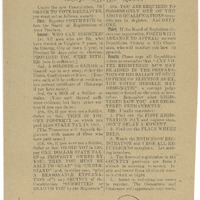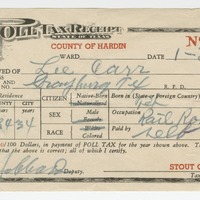 Memorial of the Freedmen of the Chickasaw Nation (1882) Memorial of the Freedmen of the Chickasaw Nation (1882) |
|
This statement prepared by two Chickasaw Freedmen used clauses in Article 3 of the Treaty of 1866 to assert that Freedmen had the right to remain in the Chickasaw Nation despite not being formally adopted as citizens. They also demanded Chickasaw Freedmen be guaranteed the right to vote within the Chickasaw Nation.
|
 Mendez v. Westminster (1947) Mendez v. Westminster (1947) |
|
Menedez v. Westminster found educational segregation toward Latino students unconstitutional.
|
 Meriam Report: General Summary of Findings and Recommendations (1928) Meriam Report: General Summary of Findings and Recommendations (1928) |
|
The Meriam Report highlighted the failures of allotment while advocating for reform.
|
 Native American Citizenship and Competency During the Allotment and Assimilationist Era Native American Citizenship and Competency During the Allotment and Assimilationist Era |
|
This teaching module explores how citizenship featured in Native American policy during the Allotment and Assimilation Era. It highlights the first formal naturalization process for individuals on a national scale. Focusing on competency commissions from 1915 to 1920, this unit guides students in analyzing how legal assessments of "competency" in the context of citizenship were shaped by race, gender, and settler values. Using primary documents— including applications, inspection reports, and naturalization rituals—this module examines how federal policies enforced whiteness and domestic norms as criteria for inclusion. The module also encourages discussion about the dual role of citizenship as both a tool of assimilation and a potential resource for Native resistance and legal agency.
|
 Nebraska Abortion Statute (1929) Nebraska Abortion Statute (1929) |
|
This Nebraska state statute regarding abortion reflects the diverse landscape of abortion law before Roe v. Wade. This law punished individuals for helping pregnant women obtain a miscarriage.
|
 Nebraska Vagrancy Law (1881) Nebraska Vagrancy Law (1881) |
|
Vagrancy acts passed by the Nebraska state legislature reflected race-neutral legal language that was used to target the poor, people of color, and women.
|
 Nebraska Vagrancy Law (1929) Nebraska Vagrancy Law (1929) |
|
Vagrancy acts passed by the Nebraska state legislature reflected race-neutral legal language that was used to target the poor, people of color, and women.
|
 Notice to Republican Voters of the 9th Congressional District of Virginia (1902) Notice to Republican Voters of the 9th Congressional District of Virginia (1902) |
|
This broadside publicized information about new voting laws and poll taxes in Virginia.
|
 Of Masters and Apprentices (1887) Of Masters and Apprentices (1887) |
|
Acts passed by the Virginia General Assembly reflected race-neutral language of the legal code after the Civil War. Application of these statutes resulted in entrenched Jim Crow segregation.
|
 Oklahoma's Poor Rich Indians: An Orgy of Graft and Exploitation of the Five Civilized Tribes, Legalized Robbery (1924) Oklahoma's Poor Rich Indians: An Orgy of Graft and Exploitation of the Five Civilized Tribes, Legalized Robbery (1924) |
|
The introduction of Zitkala-Ša's groundbreaking report opened the scene on fraud facilitated by guardians, lawmakers, and county clerks at the expense of minors, heirs, and incompetents during early Oklahoma statehood, and focused on probate courts as a site of legal exploitation.
|
 Ozawa v. United States (1922) Ozawa v. United States (1922) |
|
The Supreme Court found in Ozawa v. United States that Japanese immigrants were not eligible for naturalization, based on a contested category of whiteness. The case considered the meaning of "free white persons" from the 1906 Naturalization Act and whether factors like assimilability should be considered. While the court determined in Ozawa that the words "white person" were meant to indicate a person of the "caucasian race," the decision in U.S. v. Thind just months later stated that the word "caucasian" was meant to refer to the "common understanding" of race and not a scientific one.
|
 Pensionado Act (1903) Pensionado Act (1903) |
|
This act, passed in the aftermath of the Philippine–American War, established a scholarship program for Filipino people to receive an education in the U.S.
|
 People v. Buffum (1953) People v. Buffum (1953) |
|
One of California's pre-Roe v. Wade abortion cases, the decision in Buffum attempted to regulate abortion tourism to Mexico. This case determined that California could not legislate medical practices in Mexico, causing an increase in abortion clinics across the border in Tijuana.
|
 Perez v. Sharp (1948) Perez v. Sharp (1948) |
|
In this case, a 4-3 majority of the Supreme Court of California ruled that the state's ban on interracial marriage violated the 14th Amendment. It was the first of any state to strike down an anti-miscegenation law in the U.S, preceding Loving v. Virginia by almost 20 years.
|
 Platt Amendment (1903) Platt Amendment (1903) |
|
The Platt Amendment was a part of the Army Appropriations Act of 1901 and stipulated conditions of Cuban independence following the Spanish-American war. It laid the foundation of Cuban-U.S. relations for the next several decades.
|
 Plessy v. Ferguson (1896) Plessy v. Ferguson (1896) |
|
In Plessy v. Ferguson, the Supreme Court found that racial discrimination did not violate constitutional equal protection. This case established the principle of "separate but equal" which was overturned in 1965 by the decision in Brown v. Board of Education.
|
 Poll Tax Receipt for Lee Carr (1955) Poll Tax Receipt for Lee Carr (1955) |
|
An image of a poll tax receipt from Texas. Poll taxes were a tool to prevent Black people and poor people from voting, since the poll tax was often a significant percentage of someone's weekly income.
|
 President Johnson's Commencement Address at Howard University: "To Fulfill These Rights" (1965) President Johnson's Commencement Address at Howard University: "To Fulfill These Rights" (1965) |
|
In this speech given to Howard University's 1965 graduating class, President Lyndon B. Johnson talks about the Civil Rights and Voting Rights Acts being passed as a result of the Civil Rights Movement and the long-lasting impacts of systemic racism.
|
 Public Law 280 (1953) Public Law 280 (1953) |
|
This law gave California, Minnesota, Nebraska, Oregon, and Wisconsin criminal and civil jurisdiction on Indian reservations, as the U.S. government resolved to terminate the special trustee relationship tribes held with the United States, eroding tribal sovereignty.
|
 Racial Violence at Rock Springs, Property Compensation, and "Indemnity" during Chinese Exclusion Racial Violence at Rock Springs, Property Compensation, and "Indemnity" during Chinese Exclusion |
|
This teaching module investigates the legal concept of "indemnity" and property compensation in the wake of the Rock Springs Massacre, which targeted Chinese laborers in Wyoming Territory in 1885. When white miners attacked a Chinese labor community, Chinese survivors petitioned the New York consul and worked through diplomatic channels to demand redress. This module explores how the concept of "indemnity" relied on treaty obligations and was tied to property compensation during a moment when national legislation worked to further restrict Chinese immigration.
|
 Roberto Alvarez, et al. v. E. L. Owen, et al. (1931) Roberto Alvarez, et al. v. E. L. Owen, et al. (1931) |
|
This case was the first successful school desegregation case in the United States, decided fifteen years before Brown v. Board of Education. When the school board in Lemon Grove, California, attempted to build a separate school for students of Mexican origin, the court ruled that the segregation violated state laws which considered people of Mexican descent to be white.
|
 Scott Act (1888) Scott Act (1888) |
|
The Scott Act rejected the guarantee of free travel for Chinese people provided by the Angell Treaty of 1880. The act stated that Chinese laborers who left the U.S. would not be able to return.
|
 Selective Service Act (1917) Selective Service Act (1917) |
|
This act authorized the U.S. government to raise a national army through compulsory enlistment via a draft. The military was segregated at the time of World War I, and Black soldiers were mostly relegated to labor roles.
|
 Selective Training and Service Act (1940) Selective Training and Service Act (1940) |
|
This act authorized the U.S. government to raise a national army through compulsory enlistment via a draft. While the act prohibited discrimination based on race, the military was still segregated at the time of World War II, and Black soldiers were mostly relegated to labor roles.
|
 Seminole Agreement (1900) Seminole Agreement (1900) |
|
This congressional act ratified an agreement with the Seminole Nation concerning allotment, like enrollment and laws of descent. The second proviso established matrilineal descent of lands, money, and property for heirs.
|
 Memorial of the Freedmen of the Chickasaw Nation (1882)
Memorial of the Freedmen of the Chickasaw Nation (1882) Mendez v. Westminster (1947)
Mendez v. Westminster (1947) Meriam Report: General Summary of Findings and Recommendations (1928)
Meriam Report: General Summary of Findings and Recommendations (1928) Native American Citizenship and Competency During the Allotment and Assimilationist Era
Native American Citizenship and Competency During the Allotment and Assimilationist Era Nebraska Abortion Statute (1929)
Nebraska Abortion Statute (1929) Nebraska Vagrancy Law (1881)
Nebraska Vagrancy Law (1881) Nebraska Vagrancy Law (1929)
Nebraska Vagrancy Law (1929) Notice to Republican Voters of the 9th Congressional District of Virginia (1902)
Notice to Republican Voters of the 9th Congressional District of Virginia (1902) Of Masters and Apprentices (1887)
Of Masters and Apprentices (1887) Oklahoma's Poor Rich Indians: An Orgy of Graft and Exploitation of the Five Civilized Tribes, Legalized Robbery (1924)
Oklahoma's Poor Rich Indians: An Orgy of Graft and Exploitation of the Five Civilized Tribes, Legalized Robbery (1924) Ozawa v. United States (1922)
Ozawa v. United States (1922) Pensionado Act (1903)
Pensionado Act (1903) People v. Buffum (1953)
People v. Buffum (1953) Perez v. Sharp (1948)
Perez v. Sharp (1948) Platt Amendment (1903)
Platt Amendment (1903) Plessy v. Ferguson (1896)
Plessy v. Ferguson (1896) Poll Tax Receipt for Lee Carr (1955)
Poll Tax Receipt for Lee Carr (1955) President Johnson's Commencement Address at Howard University: "To Fulfill These Rights" (1965)
President Johnson's Commencement Address at Howard University: "To Fulfill These Rights" (1965) Public Law 280 (1953)
Public Law 280 (1953) Racial Violence at Rock Springs, Property Compensation, and "Indemnity" during Chinese Exclusion
Racial Violence at Rock Springs, Property Compensation, and "Indemnity" during Chinese Exclusion Roberto Alvarez, et al. v. E. L. Owen, et al. (1931)
Roberto Alvarez, et al. v. E. L. Owen, et al. (1931) Scott Act (1888)
Scott Act (1888) Selective Service Act (1917)
Selective Service Act (1917) Selective Training and Service Act (1940)
Selective Training and Service Act (1940) Seminole Agreement (1900)
Seminole Agreement (1900)